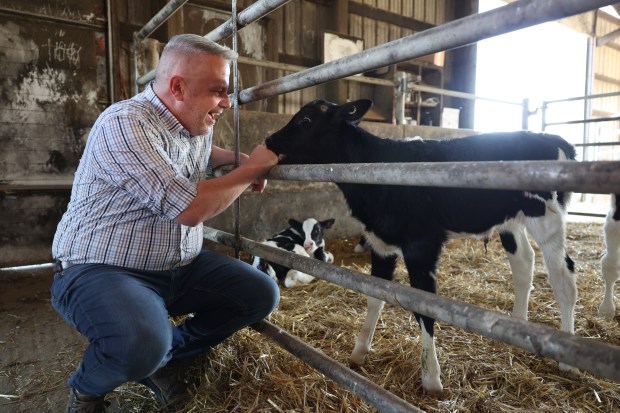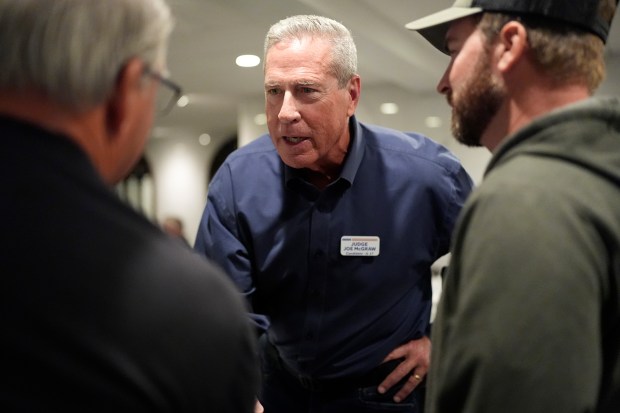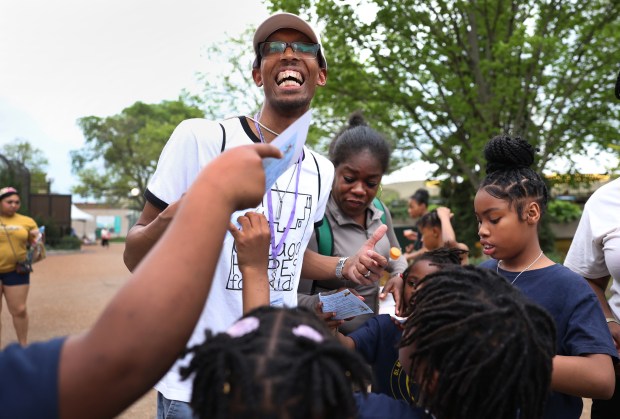MOLINE, Ill. — With Republicans winning back the White House and the U.S. Senate on Tuesday and the final balance of power in the House still unclear, Illinois Democrats successfully defended their 14-3 dominance over the GOP in the state’s congressional delegation.
In the state’s most closely watched race, first-term Democratic Rep. Eric Sorensen fended off a challenge from Republican Joe McGraw in the 17th Congressional District, a sprawling territory that spans 14 counties and melds Democratic-leaning areas such as Rockford, the Illinois half of the Quad Cities, Peoria and Bloomington-Normal by running through vast expanses of farmland and ruby-red rural communities.
Democrats have held the seat for all but two years over the past four decades, but the GOP saw an opportunity because Sorensen two years ago underperformed Joe Biden’s 2020 margin of victory over Donald Trump in the area that now makes up the district.
Sorensen, a former TV weather man from Moline, led McGraw, a recently retired judge from Rockford, 54% to 46% Wednesday, with about 88% of the estimated vote counted, according to unofficial results tabulated by The Associated Press.
AP also called the state’s 16 other congressional races for the incumbents, including 12 other Democrats in Chicago and the suburbs and one downstate, along with three downstate Republicans, two of whom ran unopposed.
Sorensen pierced through the quiet of his increasingly glum Democrat crowd Tuesday night when he bounded up a small stage’s steps and threw his arms in the air at a little before midnight to declare victory.
“Illinois made history electing its first LGBTQ member to Congress for a second time,” he told the crowd to cheers. “Now it’s about coming together to represent all of us.”
The incumbent thanked his staff and lauded his work to bring federal money back to northwest Illinois. But he quickly turned his attention to the challenges ahead, nodding to the elephant in the room of likely Republican victories.
“We are going to do what’s right. We are going to create new jobs at home. We’re going to secure reproductive rights for everyone. And we are going to make this region sustainable for our kids and grandkids,” he said.
After the presidential race was called for the Republican former president early Wednesday, Sorensen told reporters on a conference call that he would continue to find ways to work across the aisle in Washington, including working with GOP colleagues to try to pass a farm bill.
“I’m still able to work with everyone,” Sorensen said. “May just be a little bit more difficult, but my door is open, my ears are able to listen, and by standing there on the aisle, I’ll still be able to have a handshake with those on the other side.”
In a statement on social media Wednesday, McGraw conceded defeat, writing that his unsuccessful campaign “gave voice to tens of thousands of Illinoisans who are sick of watching politicians stack the deck against working families, leaving our communities behind.”
Downstate, first-term Democratic Rep. Nikki Budzinski, of Springfield, was declared the winner over Republican challenger Joshua Loyd, of Virden, to represent the 13th District, which cuts across central Illinois from Champaign-Urbana through Decatur and Springfield to the Metro East suburbs of St. Louis. Budzinski led Loyd 58% to 42%, with an estimated 91% of the vote counted, according to the AP.
In far southern Illinois, GOP Rep. Mike Bost, of Murphysboro, was declared the winner by the AP after facing a nominal challenge from Democratic Rep. Brian Roberts, of DeSoto, in the 12th District. Bost led Roberts 76% to 24%, with an estimated 74% of the vote counted.
Bost’s two fellow Republicans in the delegation, Reps. Mary Miller, of Hindsboro, and Darin LaHood, of Peoria, ran unopposed.
In the 17th District, both Sorensen and McGraw have tried, and at times struggled, to distance themselves from their respective political parties. The race in the heavily blue-collar district has centered on many of the controversial issues that have driven the presidential race at the top of the ballot, including immigration, crime, the economy and abortion rights.

In addition to the national issues at play in the race, the role religion plays in society also entered the debate, with Sorensen in a TV commercial criticizing past comments from McGraw about how prayer guided his judicial decisions, underscoring the former judge’s affinities with the religious right.

Responding to the ad, McGraw told an audience at a private event last month that he would “not apologize for praying” and that “there is no separation of church and state.”
Republicans, meanwhile, have criticized Sorensen, the state’s first openly gay member of Congress, as being too liberal for the district. They’ve latched on to past social media posts from Sorensen discussing youth drag events and criticized his support for gender-affirming health care treatments. In campaign ads, the McGraw campaign has attacked Sorensen, saying the congressman “supports exposing minors to life-altering sex changes.”
Sorensen has said voters in the district are more concerned about their own livelihoods and well-being than those issues.
In Chicago and the suburbs, all 12 Democratic incumbents faced challenges this year, but all were expected to hold onto their seats, having outraised opponents by a 16-to-1 margin.
In the 1st District, representing the South Side and southwest suburbs, first-term Rep. Jonathan Jackson, the son of the Rev. Jesse Jackson, defeated Republican Marcus Lewis, a Trump supporter who in an interview with the Tribune called the Democratic presidential nominee, Vice President Kamala Harris, “a dummy” who was “selected by the devil” to run for president. Jackson lead Lewis 64% to 36%, with about 93% of the estimated voted counted, according to the AP.
Rep. Robin Kelly, of Matteson, also won reelection, according to the AP. She has held the seat since 2013, when Jackson’s brother, Jesse Jackson Jr., resigned from Congress amid a federal corruption probe. Kelly’s challenger for the seat representing the 2nd District, which stretches from the south suburbs to Danville, was Ashley Ramos, a Latina Republican from rural Clifton. Kelly was beating Ramos 67% to 33%, with an estimated 96% of the vote counted.
Winning a second term representing the 3rd District, which runs from Chicago’s Logan Square neighborhood through DuPage County to west suburban Wheaton, was progressive Rep. Delia Ramirez, of Chicago, according to AP. She faced Republican John Booras, of Homer Glen, carrying 66% of votes to Booras’ 35%, with an estimated 93% of the vote counted.
Coming off a disappointing fourth-place finish in last year’s Chicago mayoral election, Rep. Jesús “Chuy” García was declared the winner in his reelection bid with 67% of the vote, with an estimated 94% of ballots counted. He faced a challenge in the 4th District from Republican Lupe Castillo, a relative newcomer who lives just down the street from García in the Little Village neighborhood. Castillo received about 28% of the vote. Also on the ballot in the district, which goes from Little Village to Melrose Park, was Ed Hershey of Chicago, running under the banner of the left-wing Working Class Party, who got 5%.
The AP called the North Side and northwest suburban 5th District for incumbent Rep. Mike Quigley, of Chicago, who faced a fourth challenge from self-described MAGA Republican Tommy Hanson, a Chicagoan who aligns himself with Trump’s “Make America Great Again” slogan. Quigley was beating Hanson 67% to 33%, with an estimated 95% of the vote counted.
In the 6th District, Rep. Sean Casten, of Downers Grove, won a fourth term representing territory that ranges from west suburban Lombard to south suburban Tinley Park, facing a challenge from Republican Niki Conforti, a Glen Ellyn businesswoman. Casten had nearly 54% of the vote, a 7-point lead over Conforti, with 97% of the estimated vote counted.
The oldest member of Illinois’ congressional delegation, 83-year-old Rep. Danny Davis, of Chicago, won reelection with nearly 83% of the vote, with an estimated 89% of ballots counted, the AP declared. He survived a bruising five-way Democratic primary in March to take on perennial GOP candidate Chad Koppie, 86, in the 7th District, whose boundaries go from downtown Chicago to Hillside. Koppie received less than 18% of the vote.
The largely suburban 8th District was called for Rep. Raja Krishnamoorthi, of Schaumburg, one of the most prodigious fundraisers in Congress. He beat back a challenge from Republican Mark Rice, a first-time candidate and an energy entrepreneur from Chicago, besting Rice 56% to 44%, with an estimated 97% of the vote counted.
Rep. Jan Schakowsky, of Evanston, won another two years in a seat she’s held since 1999, facing Republican challenger Seth Cohen, of Skokie. The 9th District runs from Chicago’s Uptown neighborhood through the North Shore to Lake and McHenry counties. Schakowsky had garnered 67% of the vote to 33% for Cohen, with an estimated 96% of ballots counted.
In the neighboring 10th District, which stretches from the North Shore to the Wisconsin border, Rep. Brad Schneider, of Highland Park, won a fifth consecutive term and a sixth overall in a race against Republican Jim Carris, of Lake Forest. Schneider was beating Carris 59% to 41%, with an estimated 98% of the vote counted.
The self-proclaimed “only physicist in Congress,” Rep. Bill Foster, of Naperville, was declared the winner in the 11th District, which spans from Naperville to Belvidere, with 55% of the vote, when an estimated 99% of ballots had been counted. Foster served in Congress from 2008 to 2011 and returned in 2013. This year, he faced a challenge from Republican Jerry Evans, of Warrenville, who received 45%.
Rep. Lauren Underwood, a fellow Naperville resident who became the youngest Black woman ever elected to Congress in 2018, was declared the winner in the 14th District, which runs from the Joliet area through parts of Naperville and Aurora to DeKalb and LaSalle counties, securing a fourth term. She faced a challenge from perennial candidate and former Kendall County GOP Chairman James Marter, of Oswego. Underwood had 55% of the vote to Marter’s 45%, with an estimated 99% of votes counted.
Petrella and Freishtat reported from Chicago.





